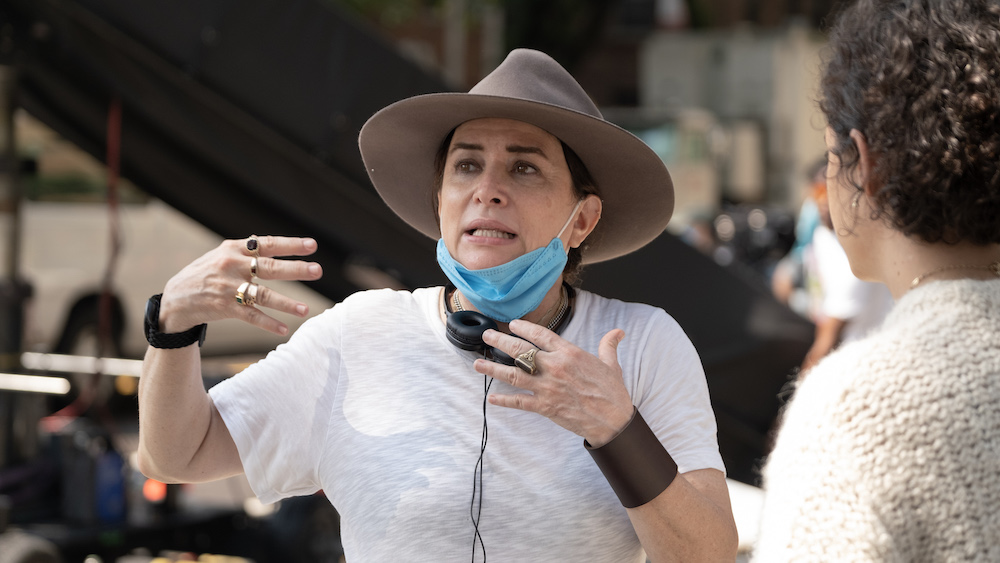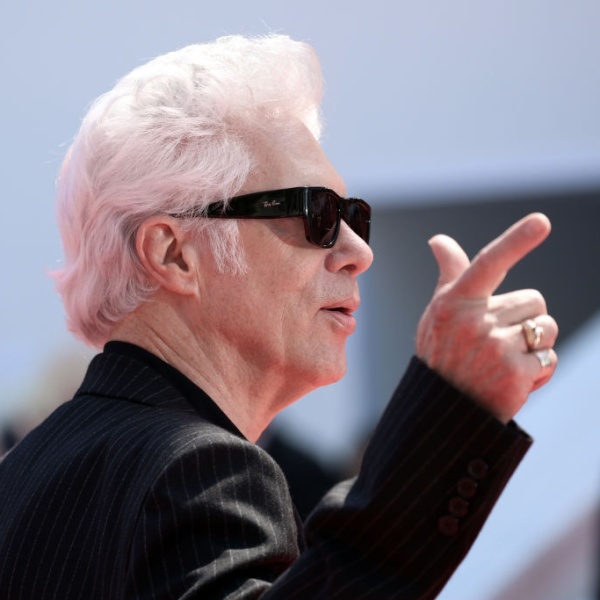In “Babes,” Neon’s raucous comedy about the intricate emotional threads that are tested when best friends become new mothers, there’s a particularly rousing scene where Eden (Ilana Glazer) and Dawn (Michelle Buteau) lose their minds on mushrooms. In need of a night away from their troubles, the lifelong pals hole up in Eden’s Queens apartment to let loose a little — OK, to let loose a lot — and it’s up to director Pamela Adlon to capture it all.
“So it’s 2:30 in the morning and they’re screaming,” Adlon said. “Michelle’s like, ‘Fuck yeah!’ Milk is squirting out of her tits. People are just screaming. Then, all of a sudden, I hear another scream and I’m like, ‘That’s not them.’ And I turn around and there’s a woman from the building in the apartment going, ‘Shut the fuck up! It’s 2:30 in the morning!’ And the producers and the location guys were like, ‘Can we jus–‘ and she’s like, ‘I don’t care! You didn’t pay me! You didn’t arrange this with me!’ And we all just stopped — what can you do? You’ve got to stop. I walked up to Michelle and said, ‘My hat is off to her. I wish I had the balls to be that real with somebody.’”
Adlon is selling herself a bit short. The Emmy-winning actor, writer, producer, and director is known for her unique ability to get real with, well, anyone. You can see it in her work, especially her tour de force FX series “Better Things.” You can feel it on set, where she takes care of her collaborators like family. And it’s more than evident when you speak with her directly, even for a few minutes. “I know every motherfucker in here,” she said during our 15-minute Zoom call, gesturing to the crew helping set up her junket interviews. “I mean, we’re all in this together.”
That sense of togetherness is vital to Adlon, and she said adopting a new crew was the biggest challenge on her feature directorial debut.
“On ‘Better Things,’ I had people on the crew who were there since the pilot,” she said. “Here, I didn’t have that shorthand, and I certainly didn’t have that relationship with everybody else who was making the movie.”
Like any good relationship, each side had to adjust. Adlon recognized that “Babes,” unlike “Better Things,” wasn’t her baby. She was brought on by co-writers Josh Rabinowitz and Glazer, who themselves were first recruited by executive producer Susie Fox, who “had a vision” of Glazer starring in a female-driven buddy comedy. In other words, “Babes” didn’t originate with Adlon — like the semi-autobiographical “Better Things” — so she knew she her job was to serve the story.
“I kind of had to get in line,” Adlon said.
But Adlon’s enthusiasm for the shoot itself, especially pre- and post-production, fed the familial vibes needed to tell a story of evolving parenthood and enduring friendship. She said location scouting was her favorite part because she got to create a “fully realized New York experience.” After living and working in Los Angeles for so long, the Manhattan native was excited to tell a classic New York story, visiting Harlem, Bushwick, Astoria, Long Island City, Flatbush, Sugar Hill, and more neighborhoods to get the setting of “Babes” just right.
“I got to walk into brownstones that were hundreds of years old, and there are people who’ve been living there for 40 fucking years,” she said. “I’m like, ‘Oh my God, tell me everything about your life!’”

Elsewhere, Adlon remembered getting swept up in a conversation with a woman who ran the register at a Dominican diner in Long Island City. When Adlon found out she also designed her own jewelry, “I bought bracelets and necklaces for the entire crew,” Adlon said.
That’s just what happens with Adlon. She wants to know people, to listen, to connect — and she expects that in return. Adlon has worked in the industry for decades, primarily as an actor, but she has a clear vision for the stories she tells, and executing that vision can require working outside conventions. That can mean putting the crew first, when other productions run them ragged, but it can also mean shooting scenes, directing actors, and pacing sequences in an atypical manner.
“This is something that I’ve run into with writers in my room: You come up, and you know the rules, and I would like to break the rules sometimes,” Adlon said.
For example, when working with cinematographer Jeffrey Kim — who Adlon called “a master of setting up a beautiful shot” — she would request a set-up or two that didn’t gel with expectations.
“So I would say to Jeff, ‘Can he just look over here? Can the camera pan right?’” Adlon said. “And he’s like, ‘It’s not going to work. It’s going to cross the line. Your editor’s going to be so mad at me.’ I’m like, ‘It’s OK! I’ll take the heat!’ And — knowing [the pressure] we were under, knowing we were under the gun — he would go with me about things that were outside of his comfort zone. [Kim] was just an incredible gift for me.”
One of her proudest accomplishments was an early scene with Glazer and Stephan James, when their characters meet, flirt, and then go on a series of dates — all while riding the subway.
“We really had to fight to be able to shoot on a real subway,” Adlon said. “We finally got the end of the line of the MTA, and we could only do 90-second takes. We could run the train for 90 seconds, and then we’d have to reverse. So we [recorded the scene] in both directions.”
Adlon, an avid fan of classic film, cited Charles Bronson’s 1976 western “From Noon Till Three” as inspiration for a moment in Eden’s life that she’ll “be reliving over and over.”
“I just said to Stephan and Ilana, ‘Let’s go,’” Adlon said. “Having the camera watch them while they’re getting to know each other, you needed to feel like they were taking four [separate] train rides — that a significant amount of time is going by. But also, I really wanted it to feel like they had a relationship because that’s so significant to Eden in this movie.”
But cutting the sequence proved to be “a total nightmare.” Adding music while minimizing the screeching sounds of a real subway ride was challenging, as was finding the right moments that could build a smooth rhythm for these two lovebirds’ dreamlike connection.
“We couldn’t do anything about that [screeching noise]. It was crazy,” Adlon said. “So then we made it part of it — it became part of the scene, to talk about the sounds of the subway.”
Glazer’s comedic chops not only helped with the edit, but created a few extra jokes in the process, and the final version of the sequence feels effortless — as if everything came together exactly as planned. The film overall is equally effervescent, an honest, unflinching comedy that’s funny all the way through, and yet still earnest and moving when it matters. While thematically similar to “Better Things” (both stories are invested in motherhood and how being a parent affects and alters so many aspects of your life), “Babes” is tonally distinct. It’s a crowd-pleaser, start to finish, and one that should play well to theaters filled with hundreds of people.
Adlon is quick to credit her colleagues, just as she’s eager for “Babes” to bring attention to the hard-working women in Hollywood, but her ability to bring everything — and everyone — together can’t be undervalued. Whether it’s the unforeseeable surprises of an indie production, building fruitful relationships with her fellow artists, or following her convictions to ensure the vision she has is realized, Adlon’s abilities as a director are manifold.
She is, as they say, a real one.
Neon will release “Babes” in theaters Friday, May 17. A wide release is scheduled for Friday, June 4.





